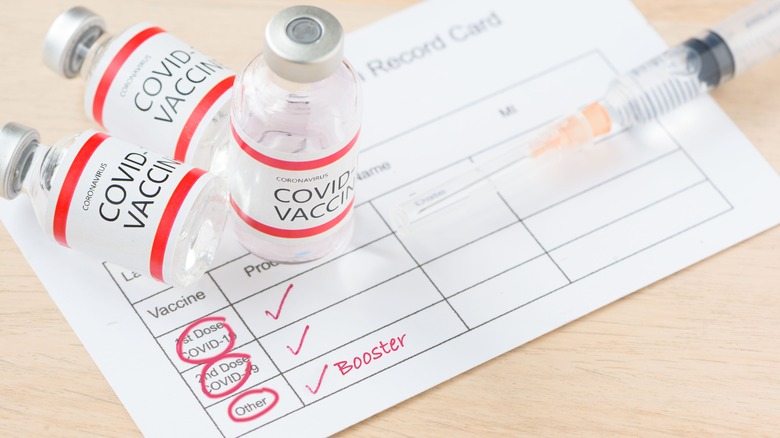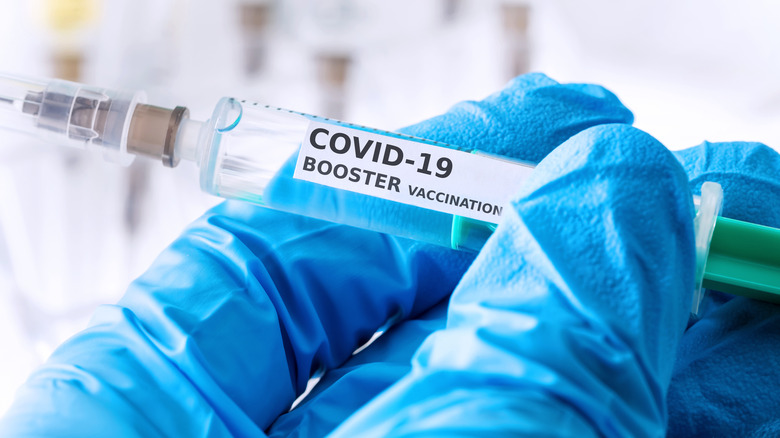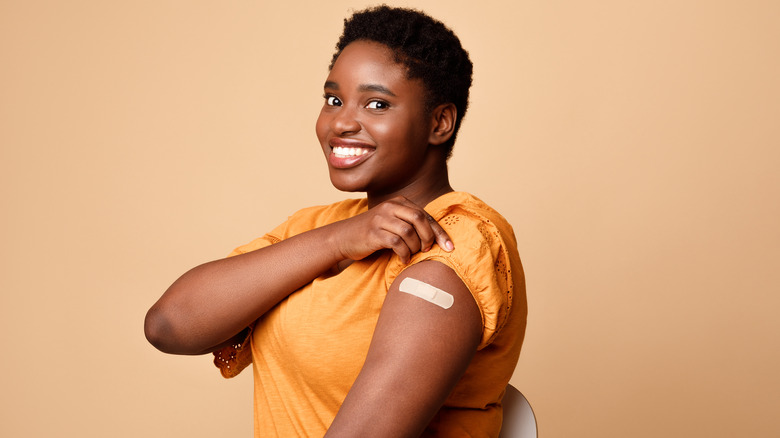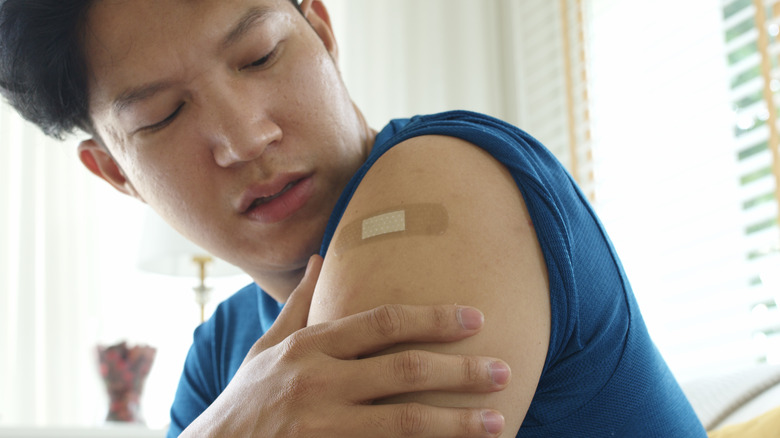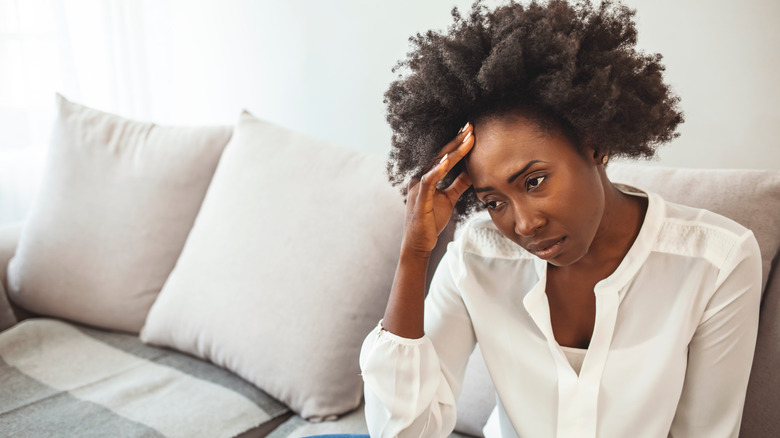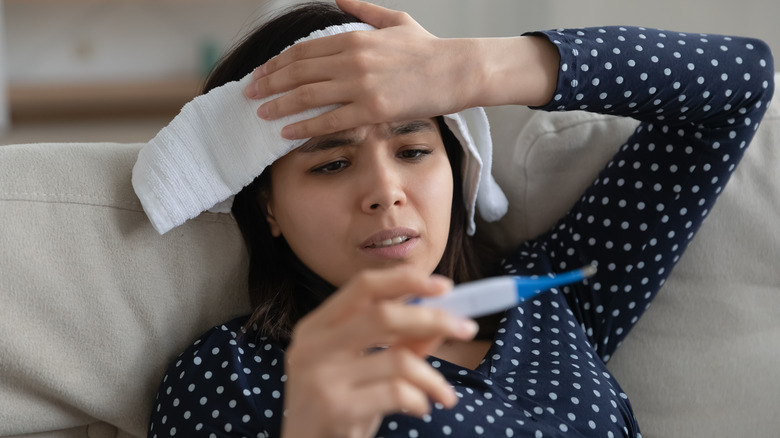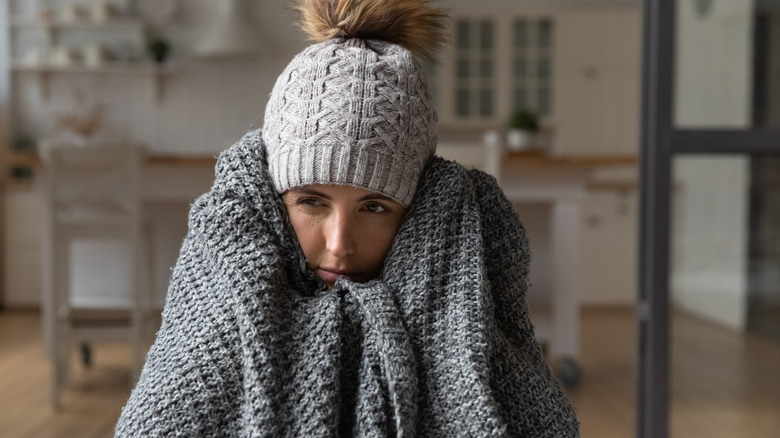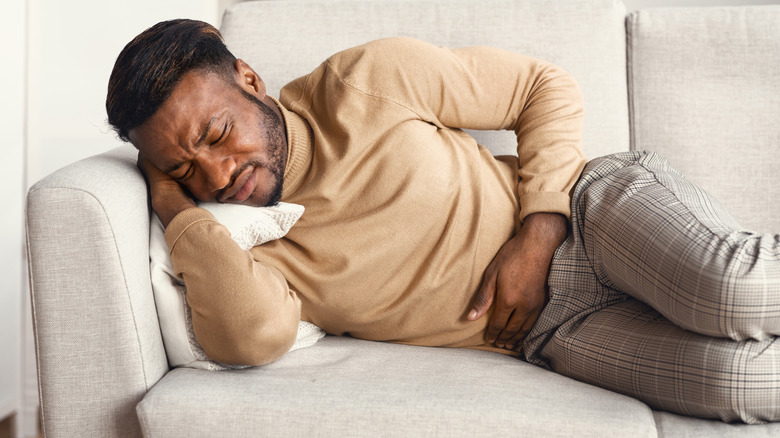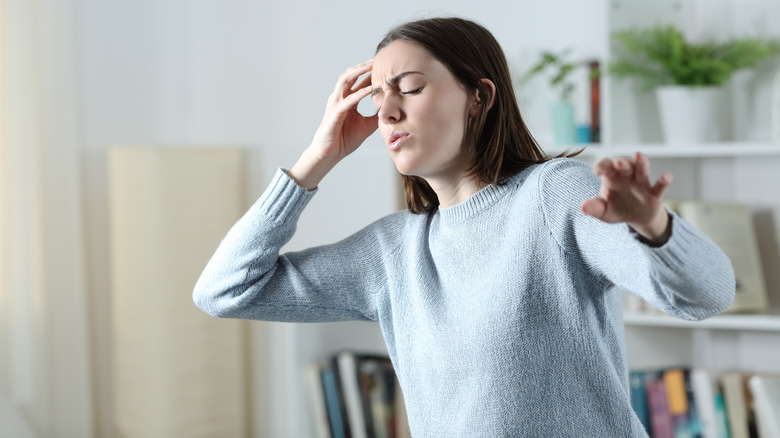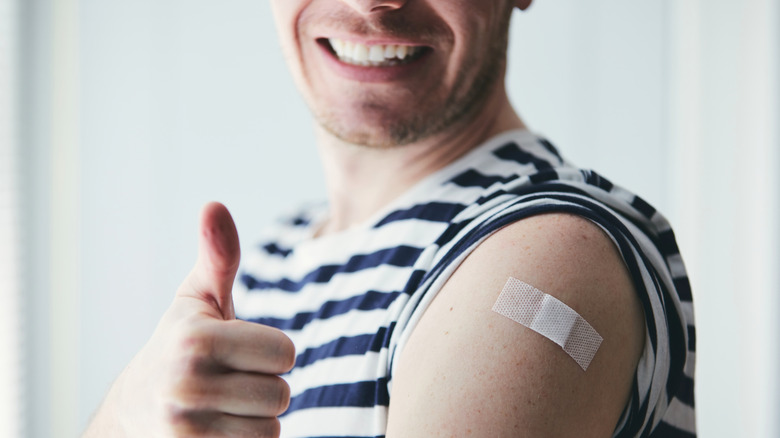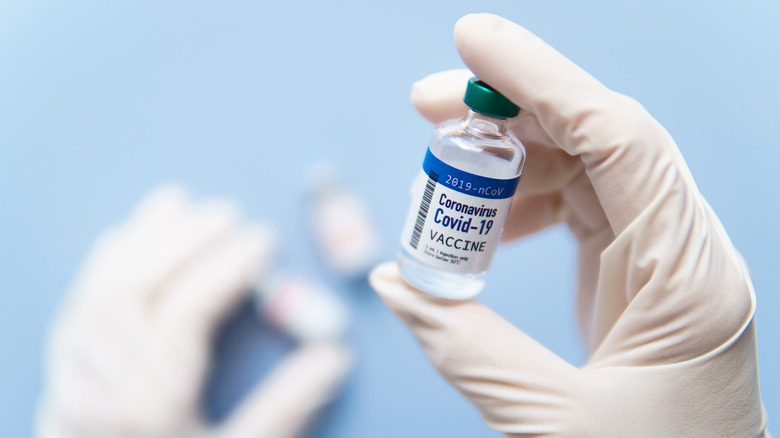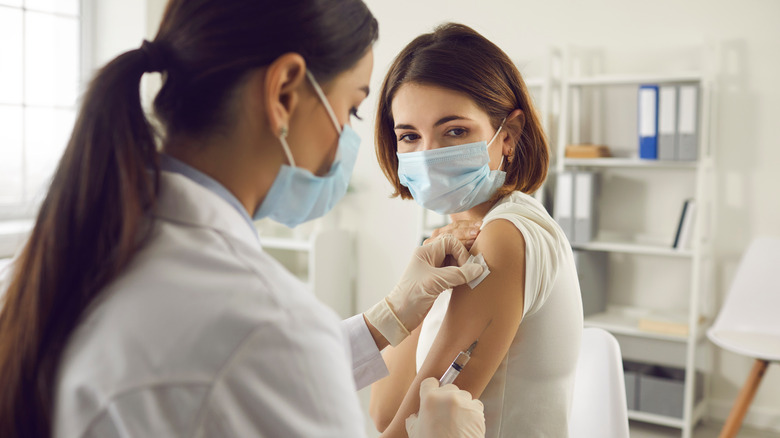All The Side Effects Of The COVID-19 Booster Shot Explained
With the Omicron variant circulating worldwide, now's the time to make sure your COVID-19 vaccinations are up to date! If you're 12 or older and five months out from your last jab of Pfizer, 18 or older and five months out from your last dose of Moderna, or 18 or older and two months out from receiving the Johnson & Johnson vaccine, then the experts at the CDC say you should get a booster for optimum protection, and pronto.
But what if you're worried about the side effects? Side effects are common with any immunization, and so it is the case with the COVID-19 vaccines, too. Most people can expect some temporary and mild side effects from boosters, but it's extremely rare to have a severe reaction. You can even "mix and match" COVID-19 vaccines and boosters safely, according to the CDC.
"It's really important to think about the booster as a way to more safely return to normal life," said Dr. Sadiya Khan, assistant professor of medicine at Northwestern University Feinberg School of Medicine via CNBC. "That's really the goal here: not to keep living in a pandemic world, but to try to move past that."
Boosters provide added protection
Throughout your lifetime, you've probably received a whole lot of vaccines to combat serious diseases like measles, polio, hepatitis, and tetanus. Many of them require three, four, or five doses (aka boosters), or even an annual shot, as if the case for the flu. Boosters for all diseases have a pretty simple purpose: They help you maintain a robust level of immunity so you don't wind up severely ill in a hospital, or worse, per Columbia University.
Dr. Anthony Fauci, chief medical adviser to President Biden, said in an interview with NPR in December, "We know that when you boost someone, you dramatically elevate the level of antibodies and other immune parameters that can protect you against infection but much more likely against severe disease. So going into the winter with the challenge of the colder months, that's what we have to do in addition to the other things, like wearing masks when you're... in indoor congregate settings."
Potentially milder symptoms
"Booster shots are proven to be safe," explained Dr. Marcus Pereira, assistant clinical professor of medicine at the Columbia University College of Physicians and Surgeons. In a Pfizer study of 10,000 participants, "they found no new adverse events, meaning it was consistent with what has been seen in previous studies," Pereira confirmed to Columbia University Irving Medical Center.
So your booster experience should be predictable and similar to your initial vaccine series, or even milder. Side effects generally resolve after a day or two, according to Yale Medicine. "I think people also understand how to manage the side effects better in terms of drinking plenty of water prior to getting a vaccine, drinking plenty of water after you get the vaccine, taking it easy the next day," as well as possibly taking an over-the-counter pain reliever, Robert Weber, administrator for pharmacy services at the Ohio State University Wexner Medical Center, told AARP.
Injection site pain
After receiving a COVID-19 booster, you'll most likely experience some injection site pain It's one of the most common side effects, according to the CDC. As SingleCare explained, this side effect is a typical complaint with many vaccinations. Between 65 and 82% of people will experience injection site pain following the COVID-19 vaccine, the site revealed.
However, you may be able to minimize arm pain following your booster. Permanente Medicine suggests deciding beforehand which arm you want for the vaccine injection. The non-dominant arm is a good choice so any pain or stiffness doesn't interfere with your activities. But others may prefer basing it on what arm they typically sleep on, as leaning on an ouchy arm can make for some rough nights.
Other helpful tips from Permanente Medicine include relaxing your arm (easier said than done!) upon getting the injection, and then keeping the arm active, such as making circular motions to increase blood flow, as this can lessen pain. Taking Tylenol or Advil after (but not before) getting your shot can also help reduce muscle pain or swelling.
Fatigue
With the Pfizer booster, which is the same dose as the initial series, the data collected shows that side effects from the booster are similar to the second of the initial two doses or even milder, reported AARP. "Pfizer's trial found that, compared to adults ages 18 to 55, those 65-plus were less likely to experience these fatigue or flu-like symptoms after receiving the booster." AARP noted that while Moderna's booster shot is half the original dose, the side effects are also similar to the second dose of the two-part vaccine. Data show that fatigue is common, as 56% of recipients reported experiencing the side effects post-booster (via Fortune).
"The day after getting these vaccines, I wouldn't plan anything that was strenuous physical activity," Dr. Peter Marks, the U.S. Food and Drug Administration's acting director of Vaccines Research and Review, who experienced fatigue after his own COVID-19 shot, told the Associated Press (via KTLA).
Headache
Headache is common with all the COVID-19 vaccines, per Johns Hopkins Medicine, and this includes boosters (via Fortune). Dr. Brian Grosberg, director of the Hartford HealthCare Headache Center, told SingleCare, "People may experience side effects like headaches from the vaccine because of the body's initial immune response."
If you experience a headache after receiving your booster, you can treat it in much the same way as any other headache. "It's perfectly fine to take NSAIDs or Tylenol if you are feeling unwell after vaccination," Dr. Colleen Kelley, an associate professor of medicine at Emory University School of Medicine, told USA Today. "The symptoms you are experiencing indicate that your immune system is functioning normally and that the immune response is ongoing."
The occurrence and severity of post-vaccination headaches vary. "Many people will have no headache at all after receiving the COVID vaccine, some may have a mild headache, while others feel their headache is severe enough that it limits their activities for the day," Dr. Jason McKnight, a clinical assistant professor at Texas A&M College of Medicine, told SingleCare.
Muscle aches
"The safety data showed that ... people had fewer reactions after their third dose than after their second dose," CDC director Dr. Rochelle Walensky said in a White House press briefing in November 2021, referring to COVID-19 boosters. One of the most common side effects, she explained, is "joint aches." But don't worry if you're not feeling that symptom. "If you had COVID a while ago or you've already got some immunity, it's more like a booster," explained Dr. Mark Loafman, chair of family and community medicine for Cook County Health in Illinois, to NBC5. "And boosters for some people are completely asymptomatic, boosters for other people trigger their immune response against it so they have some inflammation with it."
What's the best course of action if your booster hits you hard with flu-like muscle and body aches? The CDC says don't pre-medicate with over-the-counter drugs like ibuprofen or acetaminophen, or even antihistamines, in anticipation of those aches. It's not clear if those drugs will curb your immune system response and possibly blunt the effectiveness of the vaccine. However, taking an over-the-counter pain medication afterward is okay for most people, per the CDC.
Fever
Fever is not an uncommon side effect of the COVID-19 boosters (via Fortune). The fever usually starts within 2 to 12 hours after getting the vaccine. But guess what? It's just your body's normal response when building antibodies. "Although you feel terrible, it's a good thing, because those systemic effects are telling you that your body is making an immune reaction," Dr. Kate Mullane, professor of medicine and an infectious disease specialist at the University of Chicago, told Verywell Health.
In the Pfizer clinical trial "adults 65-plus were less likely to experience these fatigue or flu-like symptoms [including fever] after receiving the booster" when compared to adults ages 18 to 55, according to AARP. Moderna trials concluded the same thing.
If you're experiencing fever after your booster, rest assured that it's normal. Treat it like you would any fever. The CDC recommends drinking plenty of fluids and dressing lightly. "Fever is a normal sign that the body is building protection," confirmed the agency.
Chills
If you find yourself waking up in the middle of the night after receiving a booster shot with your teeth chattering and you just can't get warm — don't worry! Getting the chills is on the list of common reactions to COVID-19 boosters, according to CDC data (via NBC). This is what happens to lots of people when their immune system is revving up. The body detects a foreign intruder. White blood cells swarm to the site, and the resulting inflammation hits you as chills and other symptoms (via WTVA 9 News).
"Increased hydration is thought to decrease some of the symptoms like muscle aches, headaches, and chills," Dr. Mark Herbert, an infectious disease specialist at Mount Carmel Health Systems, told The Columbus Dispatch. "So it would be reasonable to drink 16 to 32 ounces of water in the time period, following the shot over that same day." Herbert also said, in agreement with the CDC, that adults taking Tylenol or similar over-the-counter medication can also provide some symptom relief.
Nausea or vomiting
While it's not one of the very top complaints, nausea and vomiting can unfortunately happen after getting the vaccine or booster, according to the CDC. To relieve nausea symptoms, Dr. Michael Daignault, an emergency physician based in Los Angeles and chief medical adviser for Reliant Health Services, recommends being "well hydrated in the days before your vaccine." He continued, telling USA Today that sipping ginger tea or "steeping hot water over sliced or grated fresh ginger" can also be helpful in managing your discomfort.
Dr. Natasha Bhuyan, regional medical director of One Medical in Phoenix, told Bustle that in addition to staying hydrated post-vaccination, it is wise to "try to focus on light foods, such as soup or crackers" for meals, just like you would any time you feel nauseous. Symptoms should subside within 48 hours, but if they don't, be sure to contact your doctor, advised Bhuyan.
Swollen lymph nodes
It's a normal reaction, but it can be alarming if you feel a swollen lymph node in your armpit after a COVID-19 vaccine. These small glands are part of your immune system. According to Nebraska Medicine, "Your lymph nodes are activated to produce white blood cells, which fight off infection. This causes the lymph nodes to swell and, possibly, to become noticeable to the touch." Swollen underarm lymph nodes can occur with all boosters, but is more commonly a side effect of the Pfizer booster, according to the FDA (via Fortune).
Per Yale New Haven Health, swollen lymph nodes following vaccination can last up to 10 days, and they can be seen on routine screening mammograms for up to a month after vaccination. For that reason, women should schedule their routine screenings four to six weeks after their vaccine.
"The COVID vaccine does not cause breast cancer or increase your risk for breast cancer," said Dr. Lisa Ann Mullen, breast imaging fellowship director and assistant professor of radiology and radiological science at Johns Hopkins Medicine, confirmed to CNN. "But it can make the lymph nodes larger, and that includes [after] the booster."
Fainting
Reports of fainting after receiving the Johnson & Johnson vaccine made the news cycle early on in the distribution process. But guess what? In the majority of cases, it was actually anxiety that was causing it. A CDC study researched the events and concluded that most symptoms of lightheadedness, dizziness, excessive sweating, and fainting were "anxiety-related events [that] can occur after any vaccination." The episodes generally lasted only about 15 minutes and were experienced primarily by women (61%), with a median age of 36 years. In interviews, "20% of the patients told vaccination site staff they had a history of fainting associated with receiving injections or an aversion to needles," according to ABC News.
Dr. David Wohl, an infectious disease specialist at UNC Chapel Hill in North Carolina, revealed that fainting is a pretty common reaction to needles. As such, it could reasonably occur after receiving a booster shot (via FDA). "We see it with the flu shot, we see it with all types of vaccines," he noted."Your heart rate, instead of speeding up as your blood pressure drops, slows down," Wohl told CBS 17. "Every day, there's people who faint when giving blood, they faint when they're having their blood drawn for a blood test. That just is very, very human."
No reaction at all
Some lucky individuals have no reaction at all to receiving the COVID-19 vaccine or booster via NPR). While others are sweating it out, nauseous, shivering, and huddled up in a ball with muscle aches, these folks are sailing right through it with ease!
How can that be, and should they be concerned about not feeling any side effects? As it turns out, there's no need to fret. Side effects are not necessary to show effectiveness. In a Johns Hopkins medical study, researchers looked into this phenomenon and concluded that "regardless of symptoms, the vast majority of participants ... developed spike IgG antibodies 14 or more days following dose 2. The one individual who didn't develop IgG antibodies was taking immunosuppressant medication.
"Your body is still developing that immunity, regardless of what type of side effects you have, or if you have any at all," explained Dr. Michael S. Phillips, NYU Langone's chief epidemiologist, confirmed via the medical center's website. So celebrate if you are feeling no pain after your booster. The experts agree that your body's response to it is working just as intended.
Rare side effects
There is another end to the spectrum of booster side effects. Like all medications and immunizations, some rare reactions can occur. One of those is anaphylaxis, which is a severe allergic response that causes blood pressure to drop suddenly and airways to narrow, per the Mayo Clinic. Such reactions happen very quickly, just 15 to 30 minutes after vaccination. This why when you get any of the COVID-19 vaccines or boosters, you're asked to wait on site for 15 minutes before leaving the facility, out of an abundance of caution. "If you've had allergic reactions in the past, we want people staying for 30 minutes," Dr. Kate Mullane, professor of medicine and an infectious disease specialist at the University of Chicago, told Verywell Health.
Another rare potential side effect that has affected some people — mostly male adolescents and young adults – is the development of inflammation of the heart muscle or inflammation of the lining outside the heart after receiving the Pfizer or Moderna vaccines. However, per Johns Hopkins Medicine, "The vast majority of myocarditis or pericarditis cases are mild and resolve quickly. Myocarditis is more likely to occur as a result of COVID-19 infection than as a side effect of the vaccines."
Get your booster to remain 'optimally protected'
As of January 27, the CDC's stats show that over 75% of Americans have already gotten one COVID-19 dose and 63.8% are fully vaccinated. Additionally, 41.5% of the fully vaccinated U.S. population has received one additional dose (a booster shot). So there's plenty of real-world, good data to go around about the efficacy and side effects of boosters.
"If you're weighing the side effects of the vaccine versus the effects of COVID, I would take the side effects of the vaccine any day," Dr. Aaron Milstone, associate hospital epidemiologist at the Johns Hopkins Hospital, told NBC's Today.
In view of the infectious Omicron variant, Dr. Anthony Fauci said in an interview with CNN that "it's going to be a matter of when, not if" the third shot will be required for a fully vaccinated status (via U.S. News & World Report). He explained, saying, "For me, as a public health person, I just say get your third shot — forget about what the definition is. I just want to see people be optimally protected." And although Pfizer and Moderna are working on Omicron-specific boosters, medical analyst Dr. Leana Wen told CNN that you shouldn't wait until they become available. "Everyone eligible to receive a booster should do so now," she explained.
